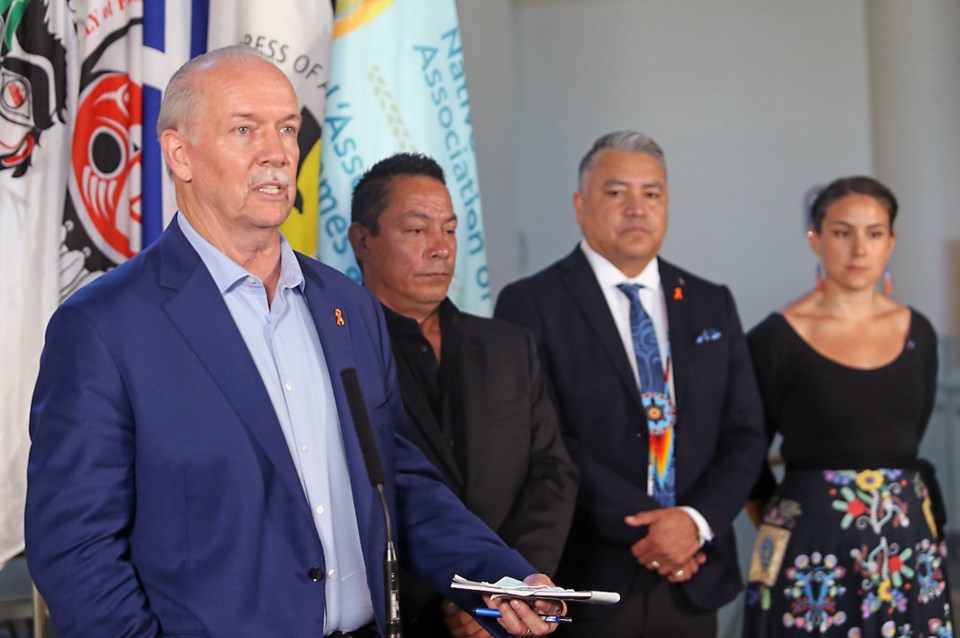Premiers, health-care representatives and Indigenous leaders meeting in Victoria on Monday all agreed Canada’s health-care system needs to be rebuilt with the help of a cash infusion from the federal government.
“We need to re-imagine public health care in Canada,” said B.C. Premier John Horgan, chair of the Council of the Federation, representing the country’s premiers.
“The whole continuum of care needs to be revisited. And now is the time to do that.”
Health care, labour shortages and COVID-19 recovery are dominating a two-day meeting of premiers at the Fairmont Empress.
The premiers, who met with the heads of the Canadian Medical Association and Canadian Federation of Nurses and nurses’ unions Monday, are asking for a $28-billion increase to health funding from the federal government, representing 35 per cent of health care spending, up from 22 per cent.
Early last year, Prime Minister Justin Trudeau indicated increases would have to wait until the country was through the worst of the pandemic.
Horgan said the country is now eight months past the turning point in the pandemic.
“We need sustainable, predictable funding from Ottawa so we can build out our budgets, make commitments to health-care professionals about how we’re going to meet their needs, and most importantly, how we’re going to service the patients who expect nothing less than our best effort.”
Intergovernmental Affairs Minister Dominic LeBlanc said Monday on CBC’s Power and Politics that the 22 per cent federal share of health spending cited by the provinces doesn’t include tax transfers to the provinces that are worth about $20 billion a year, or federal spending during the pandemic to take the burden off the provinces — which allowed some provinces to run surpluses.
But Horgan said “it’s disingenuous at best” to suggest the federal government is carrying its load in health care. No one experiencing the crisis in health care wants to hear politicians “quibble about the numbers,” he said.
Canadian Medical Association president Katharine Smart, who met with the premiers Monday, said the health-care crisis — from labour shortages to ERs closing — requires a top-to-bottom rebuild with short-, medium- and long-term achievable goals and federal cash.
The situation has become “catastrophic,” said Smart. There’s no area where people aren’t saying it’s a crisis, whether “you’re a specialist, family doctor, hospitalist, surgeon, ER doctor, rural doctor, urban doctor,” she said.
Nursing leaders said the same, telling premiers that patients and nurses are suffering through a “dire staffing crisis.”
Horgan shared Monday that he saw the nursing shortage first hand when he was in hospital for throat cancer and his morning nurse became his night nurse because there was no replacement.
Smart said throwing “more dollars at a broken system isn’t going to improve things and we know that we already spend a lot of dollars per capita.”
At issue is an outdated system that hasn’t been modernized since the 1960s, she said.
Major problems, said Smart, include a critical labour shortage, a disastrous medical records system across the country that is neither efficient nor co-ordinated, lack of a pan-Canadian workforce strategy and pan-Canadian licence for doctors, and the infrastructure costs involved in running a family practice.
The Canadian Medical Association would like to see different styles of physician remuneration, additional “fee codes” to bill the government for more services, better support for team-based care that includes mental-health practitioners, and a review of the growing burden of administrative work that sees physicians spending nights and weekends doing unpaid paperwork and chart reviews.
There also has to be better home-care options for aging Canadians who don’t need to be in hospital but can’t get into long-term care or don’t have the help needed to return home, said Smart.
Earlier in the day, Lisa Weber, vice-president of the Native Women’s Association of Canada, stood with Songhees Chief Ron Sam and Esquimalt Chief Rob Thomas, who hosted a meeting of premiers and the National Indigenous Organization at the Songhees Wellness Centre in Esquimalt.
Weber said Indigenous people need to be included in the conversation about how to rebuild the health-care system.
“There is a lot of skills, knowledge, motivation and just huge commitment from Indigenous professionals at all levels and they are just not at the table.”
A report released in December 2020 detailed examples of racism in B.C.’s health-care system.
There’s a lack of confidence in the health-care system, especially among elderly and disabled Indigenous people, who feel they’re not being heard, said Weber. Health-care facilities that offer translation and culturally appropriate services would go a long way in building trust, she said.



